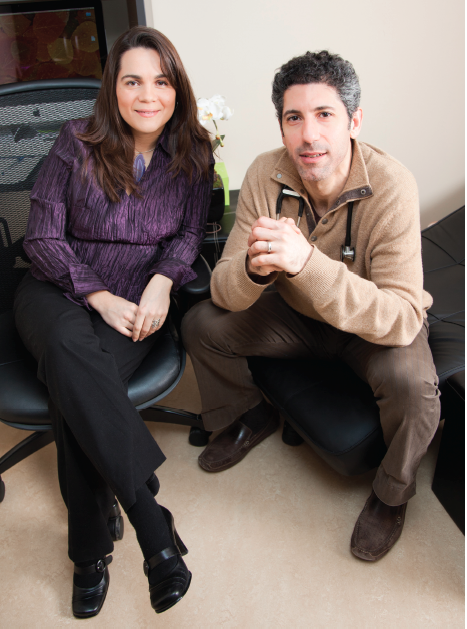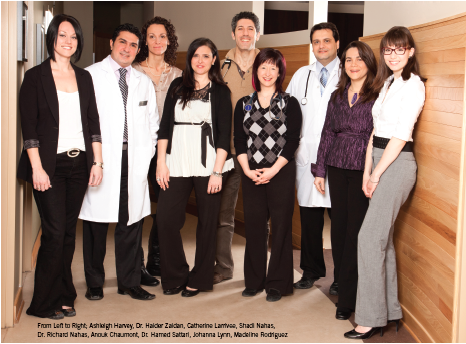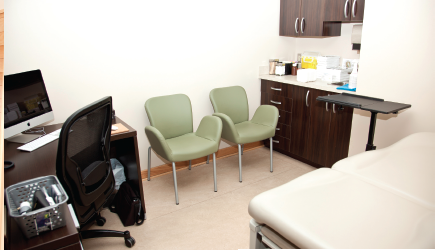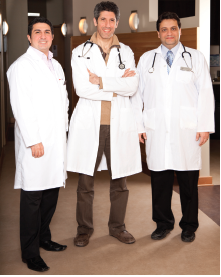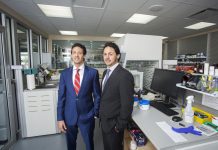Dr Richard Nahas, md
Seekers Centre for Integrative Medicine
In downtown Ottawa operates an exceptional facility of integrative medicine, established by the husband and wife team of Dr Shadi Nahas, PhD, Director of Research, and Dr Richard Nahas, MD, Medical Director. Richard’s training and continued commitment as an ER physician may not seem to be a typical path upon which a physician comes to embrace integrative medicine, yet it is precisely this path that the doctor credits with driving his vision of the facility existing today.
Following an undergraduate degree in biochemistry from Ottawa University, Richard attended medical school at the University of Toronto, completing his training in 1998. Typical of conventionally- trained physicians who go on to embrace integrative medicine, Richard felt there were gaps in knowledge during his training. His interest in integrative medicine began in his teen years in relation to application of principles of clinical nutrition in performance enhancement, sports psychology, and the notion of training the mind along with the body. He chose medicine as his path eager to learn the intricacies of the human body and was disappointed with the relative lack of knowledge academia was able to impart. The focus was on describing disease, with very poor understanding of the underlying causes of the diseases being studied.
He found himself gravitating towards emergency medicine, feeling it was what conventional medicine did best. Seeking an opportunity to learn a broader understanding of medicine, Richard began to travel the world delivering his ER skills to areas that seemed to require them most. His travels included elective study in Egypt, clinical rotation in Gaza, as well as service with Doctors Without Borders taking him to Johannesburg, Africa and the Amazon of South America. These travels further spurred his interest in integrative medicine. He found conventional medicines helped people in these settings in the short term, but felt the people were better served by their local medicines in terms of long term feasibility as well as chronic disease management. Travel experiences taught Richard that political/ economic factors are at the heart of healthcare issues in developing nations, as opposed to more medicine serving as a viable solution. Also, the experiences exposed Richard to a wide array of local, traditional healing systems that he found intriguing.
Richard returned to his home town of Ottawa resolved to serve his community with integrated systems of healing. While conventional medicine inarguably offers world- class care in emergency settings, Canada is entrenched in epidemics of chronic illness- the arena where integrative medicine demonstrates its greatest strength. Richard’s opinions and perspective on the integrative versus conventional medicine debate are certainly strong, however shortcomings of conventional models of care are not where he chooses to apply his focus. “I must balance my feelings of how much change is required”, Richard describes.
“There are many challenges that surface in operating an integrative practice, including lack of recognition and understanding from peers, the reality of practicing in isolation and an inability to consult with colleagues for direction on difficult cases, but this is typical of individuals who choose the path of a pioneer”.
So we pose the question to Richard that surely it would be easier to remain in ER practice… “When you believe in what you are doing, you see results, you know in your heart it is a better system of medicine… you don’t have a choice, you can’t go back”, he replied.
Being critical of conventional medicine does not improve the situation, and in fact serves little purpose other than to make things worse. An integrative physician truly hoping to impact the healthcare system must make effort to work with the system around them, regardless of obstacles that may present before them. Richard describes one example that exemplifies the requirement for integrative practitioners to consider efforts of collaboration among their highest priorities:
“The Seekers Centre of Integrative Medicine served as one centre for the TACT trial of chelation in secondary coronary prevention. One patient wanted to join the trial, but their local cardiologist instructed them not to join, stating that he did not believe in chelation. The cardiologist ended up being the chief cardiologist at the Ottawa Heart Institute. I undertook the task of contacting the cardiologist to discuss the role of chelation and the outcomes I had already witnessed it achieve in terms of angina treatment. We have since ended up being collaborators in many areas, he referred 50-60 patients that ended up as participants in the trial, and we are discussing conducting a trial together to assess vascular compliance at the Ottawa Heart Institute”.
